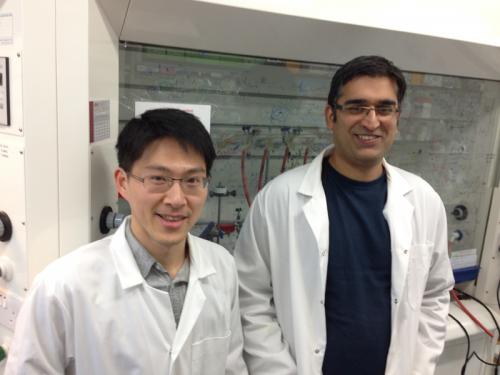
Chemical probe brings new insight into Parkinson's disease
E3 ligases are one of the largest enzyme families and they confer substrate specificity in the ubiquitin conjugation process. E3 activity is often stringently regulated and aberrant activity is the hallmark of many diseases including neurodegeneration, cancer and autoimmune disorders. However, methods for studying E3 activity are limited therefore new tools that directly measure E3 activity, and that are compatible with endogenous enzymes, would serve as powerful probes for providing insight into the underlying pathology of many diseases. This could also lead to the identification of novel therapeutic targets.
Pioneering chemical probe technology developed at the MRC Protein Phosphorylation and Ubiquitylation Unit is giving scientists the clearest insight yet into E3s that are active in many diseases, including Parkinson's disease.
Dr Satpal Virdee, leader of the research team, said their findings could "revolutionise" research capability.
Working in collaboration with Dr Miratul Muqit, the team have used their newly developed probes to make novel discoveries relating to the activity of Parkinson's disease-associated E3, Parkin.
The results of the research are published in the journal Nature Chemical Biology.
The group have reengineered the native substrate of E3s, a ubiquitin-charged E2 conjugating enzyme, such that it covalently labels E3s belonging to the HECT and RBR subfamilies, in an activity-dependent manner. These 'activity-based probes' allow not only a single E3's activity in a cell to be measured directly, but in principle, the activity of dozens of E3s to be measured simultaneously.
'This technology should revolutionise our ability to understand the roles of E3s and protein ubiquitylation in both normal and diseased cells with immediate translational potential to address diseases,' said Dr Virdee.
Dr Virdee's team have tested the technology by looking at an E3 enzyme, Parkin, which when faulty can give rise to Parkinson's disease.
'We made a number of novel findings around how Parkin is activated in the cell.'
'For the first time our probes enable direct and quantitative measurement of endogenous Parkin activity. Our probes have given new insights into the pathogenic basis for the many patient mutations that are found within Parkin. We have also shown that our technology can potentially be used as an urgently needed clinical tool to assess the functionality of the Parkin pathway in patients.'
The technology breakthrough could offer multiple benefits for researchers including discovery of novel E3 biology, new therapeutic targets and as a clinical diagnostic tool.
The research was carried out in collaboration with Dr Miratul Muqit's group in the MRC PPU at Dundee and with colleagues at Sorbonne Universités in Paris.
We have also initiated a search for two postdoctoral researchers to work in this area - for further information please contact Satpal Virdee (s.s.virdee@Dundee.ac.uk).
Pioneering chemical probe technology developed at the MRC Protein Phosphorylation and Ubiquitylation Unit is giving scientists the clearest insight yet into E3s that are active in many diseases, including Parkinson's disease.
Dr Satpal Virdee, leader of the research team, said their findings could "revolutionise" research capability.
Working in collaboration with Dr Miratul Muqit, the team have used their newly developed probes to make novel discoveries relating to the activity of Parkinson's disease-associated E3, Parkin.
The results of the research are published in the journal Nature Chemical Biology.
The group have reengineered the native substrate of E3s, a ubiquitin-charged E2 conjugating enzyme, such that it covalently labels E3s belonging to the HECT and RBR subfamilies, in an activity-dependent manner. These 'activity-based probes' allow not only a single E3's activity in a cell to be measured directly, but in principle, the activity of dozens of E3s to be measured simultaneously.
'This technology should revolutionise our ability to understand the roles of E3s and protein ubiquitylation in both normal and diseased cells with immediate translational potential to address diseases,' said Dr Virdee.
Dr Virdee's team have tested the technology by looking at an E3 enzyme, Parkin, which when faulty can give rise to Parkinson's disease.
'We made a number of novel findings around how Parkin is activated in the cell.'
'For the first time our probes enable direct and quantitative measurement of endogenous Parkin activity. Our probes have given new insights into the pathogenic basis for the many patient mutations that are found within Parkin. We have also shown that our technology can potentially be used as an urgently needed clinical tool to assess the functionality of the Parkin pathway in patients.'
The technology breakthrough could offer multiple benefits for researchers including discovery of novel E3 biology, new therapeutic targets and as a clinical diagnostic tool.
The research was carried out in collaboration with Dr Miratul Muqit's group in the MRC PPU at Dundee and with colleagues at Sorbonne Universités in Paris.
We have also initiated a search for two postdoctoral researchers to work in this area - for further information please contact Satpal Virdee (s.s.virdee@Dundee.ac.uk).

